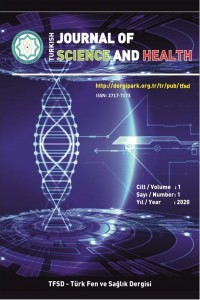
Turkish Journal of Science and Health
Yazarlar: Muhammet NALDAN, Mesut IŞIK, Yeliz DEMİR, Hatice Esra DURAN, Şükrü BEYDEMİR, Duygu KARA, Abdullah TUNÇ
Konular:Farmakoloji ve Eczacılık
Anahtar Kelimeler:Oxidative stress,Anesthetic drugs,Inhibition,Antioxidant enzyme
Özet: Some studies have shown that anesthetic drugs cause various changes in the antioxidant system. The aim of our study has investigated the effects of propofol, thiopental, propofol+midazolam, and thiopental+midazolam anesthesia on oxidative stress and antioxidant enzyme activity in serum of surgical patients anesthetized with anesthetic drugs. Patients were divided into four equal groups with a computer-assisted randomization list. The first group for induction was propofol 2 mg kg-1, the second group 4 mg kg-1 thiopental sodium, the third group 1 mg kg-1 propofol and 0.1 mg kg-1 midazolam, the fourth group 2 mg kg-1 thiopental and 0.1 mg kg-1 midazolam in combination. There are 60 patients (20-40 years old, male) in total, 15 in each group. In this study, combined anesthetic drugs (thiopental-midazolam and propofol-midazolam) cause an increase in TSH and GSH levels. Propofol, thiopental, propofol-midazolam, and thiopental-midazolam inhibit PON1 and GST activity. The results show different effects on oxidative stress and antioxidant system according to the use of propofol, thiopental, propofol-midazolam, and thiopental-midazolam drugs in groups. These results suggest that this study provides information about the change of antioxidant systems with the use of this anesthetic drugs. Therefore, these drugs should be used with caution in order to reduce the side effects that may occur in patients.